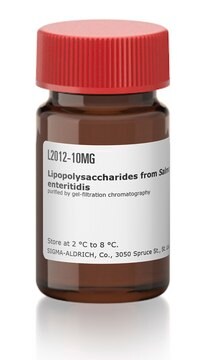L3137
Lipopolysaccharide aus Escherichia coli O127:B8
purified by gel-filtration chromatography
Synonym(e):
LPS
Anmeldenzur Ansicht organisationsspezifischer und vertraglich vereinbarter Preise
Alle Fotos(1)
About This Item
Empfohlene Produkte
Biologische Quelle
Escherichia coli (O127:B8)
Qualitätsniveau
Form
lyophilized powder
Aufgereinigt durch
gel-filtration chromatography
Verunreinigungen
<1% Protein
Farbe
white to yellow cast
Löslichkeit
water: soluble
Versandbedingung
ambient
Lagertemp.
2-8°C
Suchen Sie nach ähnlichen Produkten? Aufrufen Leitfaden zum Produktvergleich
Allgemeine Beschreibung
This product is extracted from E. coli serotype O127:B8 and purified by gel filtration. The source strain is ATCC 12740. This LPS serotype has been used in the study of septic shock and to induce NOS in murine macrophages and PAF synthesis in rat glomerular masangial cells.
Anwendung
Lipopolysaccharide (LPS) sind charakteristische Bestandteile der Zellwand von gramnegativen Bakterien. LPS und seine Lipid-A-Gruppe stimulieren Zellen des angeborenen Immunsystems durch den Toll-like-Rezeptor 4 (TLR4). TLR4 gehört zur Toll-like-Rezeptor-Proteinfamilie, die häufige Pathogen-assoziierte molekulare Strukturen (PAMPs) erkennt.
Biochem./physiol. Wirkung
Lipopolysaccharides (LPS) are localized in the outer layer of the membrane and are, in noncapsulated strains, exposed on the cell surface. They contribute to the integrity of the outer membrane, and protect the cell against the action of bile salts and lipophilic antibiotics.
Angaben zur Herstellung
The product is soluble in water (5 mg/ml) or cell culture medium (1 mg/ml) yielding a hazy, faint yellow solution. A more concentrated, though still hazy, solution (20 mg/ml) has been achieved in aqueous saline after vortexing and warming to 70-80 oC. Lipopolysaccharides are molecules that form micelles in every solvent. Hazy solutions are observed in water and phosphate buffered saline. Organic solvents do not give clearer solutions. Methanol yields a turbid suspension with floaters, while water yields a homogeneously hazy solution.
Sonstige Hinweise
To gain a comprehensive understanding of our extensive range of Lipopolysaccharides for your research, we encourage you to visit our Carbohydrates Category page.
Ähnliches Produkt
Produkt-Nr.
Beschreibung
Preisangaben
Signalwort
Danger
H-Sätze
Gefahreneinstufungen
Acute Tox. 2 Oral
Lagerklassenschlüssel
6.1A - Combustible acute toxic Cat. 1 and 2 / very toxic hazardous materials
WGK
WGK 3
Flammpunkt (°F)
Not applicable
Flammpunkt (°C)
Not applicable
Hier finden Sie alle aktuellen Versionen:
Besitzen Sie dieses Produkt bereits?
In der Dokumentenbibliothek finden Sie die Dokumentation zu den Produkten, die Sie kürzlich erworben haben.
Kunden haben sich ebenfalls angesehen
Taichiro Nonaka et al.
The Journal of clinical investigation, 126(4), 1367-1382 (2016-03-15)
Most skin cancers develop as the result of UV light-induced DNA damage; however, a substantial number of cases appear to occur independently of UV damage. A causal link between UV-independent skin cancers and chronic inflammation has been suspected, although the
Evelin Painsipp et al.
PloS one, 6(6), e20719-e20719 (2011-06-16)
Immune challenge by bacterial lipopolysaccharide (LPS) causes short-term behavioral changes indicative of depression. The present study sought to explore whether LPS is able to induce long-term changes in depression-related behavior and whether such an effect depends on mouse strain and
Choon Kit Tang et al.
Biomaterials, 30(7), 1389-1400 (2008-12-09)
Receptor mediated gene delivery is an attractive non-viral method for targeting genetic material to specific cell types. We have previously utilized oxidized (OMPLL) and reduced mannan poly-L-lysine (RMPLL) to target DNA vaccines to antigen presenting cells and demonstrated that it
Eugene S Yim et al.
Journal of biomedical materials research. Part A, 91(3), 894-902 (2008-12-17)
Hydrogel polymers comprise a novel category of synthetic materials being investigated for use in cartilage replacement. One candidate compound, a poly(ethylene glycol)/poly(acrylic acid) (PEG/PAA) interpenetrating polymer network (IPN), was developed for use in corneal prostheses and was recently engineered for
Mitsuaki Moriyama et al.
Neurochemical research, 41(11), 3138-3146 (2016-11-04)
The biomolecule acetate can be utilized for energy production, lipid synthesis, and several metabolic processes. Acetate supplementation reduces neuroglial activation in a model of neuroinflammation induced by intraventricular injection of lipopolysaccharide (LPS). To investigate the mechanisms underlying the anti-inflammatory effect
Unser Team von Wissenschaftlern verfügt über Erfahrung in allen Forschungsbereichen einschließlich Life Science, Materialwissenschaften, chemischer Synthese, Chromatographie, Analytik und vielen mehr..
Setzen Sie sich mit dem technischen Dienst in Verbindung.



